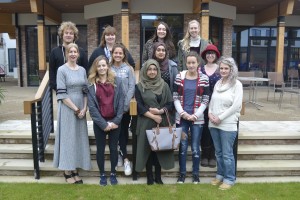The York St John Occupational Therapy team have had a number of abstracts accepted for the 2017 COT Conference.
This abstract is an example of one of our student as co researcher projects (SCoRe). This project was lead by Senior Lecturers Hannah Spring, Fiona Howlett and involved final year students Joe Antcliff, Emily Hirst, Ashton Alderson, Kim Dutton, Olivia Gray, Zeba Jabeen, Myra Jamil, Sally Mattimoe, Siobhan Waister and Claire Connor.
There is a growing body of evidence identifying the occupational implications and occupational deprivation of people who have been displaced due to war and political unrest (Morville, 2014; WFOT, 2014). Services that provide practical and emotional support helping to orientate asylum seekers and refugees to manage the complex and unfamiliar processes of everyday life in the UK have been found to be beneficial (Smith, 2015). The main aims of our project were:
- To evaluate the value and meaning of a drop-in centre service offering social and occupational support and refugees and asylum seekers in the North East of England.
- To identify the occupational preferences of the service users and make recommendations for occupational therapy practice.
A phenomenological interpretative design was used to meet the research aims. Using purposive sampling techniques, participants were recruited from a drop-in centre for asylum seekers and refugees based in the North East of England. Data was collected using semi-structured interviews, recorded and transcribed verbatim. Interview questions focussed on the experiences, meaning and value of using the drop-in service. Findings indicated that the participants placed considerable value in the drop-in service. Emergent themes from the study focussed on sense of community and cultural integration, altruistic focussed occupations, and opportunities for productivity through aspects such as volunteering. The results and conclusions from this study provide important insights into how drop-in services add value and meaning to the occupations of asylum seekers and refugees in the UK. Furthermore, as the first of its kind, the study supports future strategic direction in developing and enhancing services for asylum seekers and refugees, both in the wider community and in contributing to the evolving evidence base in occupational therapy.

